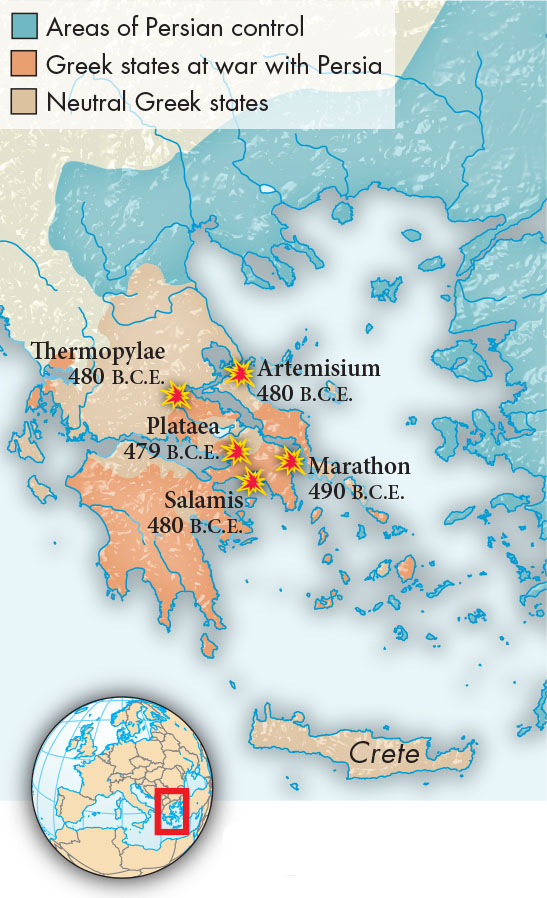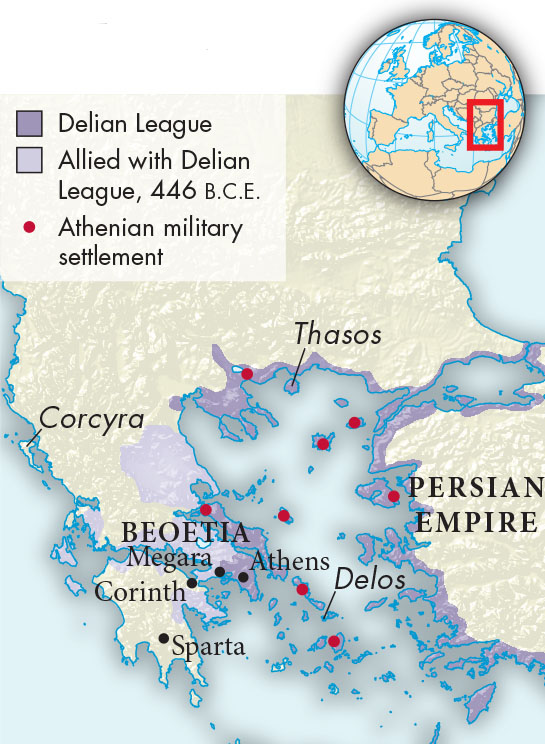A History of World Societies:
Printed Page 123
A History of World Societies Value
Edition: Printed Page 122
Chapter Chronology
The Deadly Conflicts, 499–404 B.C.E.

The Persian Wars, 499–479 B.C.E.
In 499 B.C.E. the Greeks who lived in Ionia unsuccessfully rebelled against the Persian Empire, which had ruled the area for fifty years (see Chapter 2). The Athenians provided halfhearted help to the Ionians, and in retaliation the Persians struck at Athens, only to be surprisingly defeated by the Athenian hoplites at the Battle of Marathon. (According to legend, a Greek runner carried the news of the victory to Athens. When the modern Olympics began in 1896, they included a long-distance running race between Marathon and Athens, a distance of about twenty-five miles, designed to honor the ancient Greeks.) In 480 B.C.E. the Persian king Xerxes (ZUHRK-seez) personally led a massive invasion of Greece. Under the leadership of Sparta, many Greek poleis, though not all, united to fight the Persians, and they engaged in major battles at the pass of Thermopylae and in the waters off Artemisium. The larger Persian army was victorious and occupied Athens, but only a month or so later the Greeks defeated the Persian navy in the decisive Battle of Salamis, an island across from Athens, and in 479 B.C.E. they overwhelmed the Persian army at Plataea.

The Delian League, ca. 478–431 B.C.E.
The victorious Athenians and their allies then formed the Delian League, a military alliance intended to liberate Ionia from Persian rule and keep the Persians out of Greece. While driving the Persians out of Asia Minor, the Athenians also turned the league into an Athenian empire. They reduced their allies to the status of subjects, often collecting tribute by force and taking control of their economic resources. Athenian ideas of freedom and democracy did not extend to the citizens of other cities, and cities that objected to or revolted over Athenian actions were put down. (See “Viewpoints 5.1: Two Opinions About Athenian Democracy.”)
Under their great leader Pericles (PEHR-uh-kleez) (ca. 494–429 B.C.E.), the Athenians grew so powerful and aggressive that they alarmed Sparta and its allies. In 431 B.C.E. Athenian imperialism finally drove Sparta into the conflict known as the Peloponnesian War. The Peloponnesian War lasted a generation (431–404 B.C.E.) and brought in its wake disease, widespread civil wars, destruction, famine, and huge loss of life. With thousands of soldiers, Athens launched an attack on the island of Sicily, which ended in disaster. The Spartans encouraged revolts in cities that were subject to Athens and defeated the once-mighty Athenian fleet in naval battles. In 404 B.C.E. the Athenians finally surrendered, and Sparta stripped it of its empire. Conflicts among the states of Greece continued, however.
Writers at the time described and analyzed these wars, seeking to understand their causes and consequences. Herodotus (ca. 484–425 B.C.E.) traveled the Greek world to piece together the course of the Persian wars. Although he consulted documents when he could find them, he relied largely on the memories of the participants, and he presented all sides if there were conflicting views. Thucydides (ca. 460–ca. 399 B.C.E.) was an Athenian general in the Peloponnesian War but was banished early in the conflict because of a defeat; after this he traveled throughout Greece seeking information about the war from all sides. His account of the war saw human greed and desire for power as the root of the conflict, and he viewed the war itself as a disaster. As he told it, at the outbreak a Spartan ambassador warned the Athenians: “This day will be the beginning of great evils for the Greeks.”3 Thucydides agreed.

